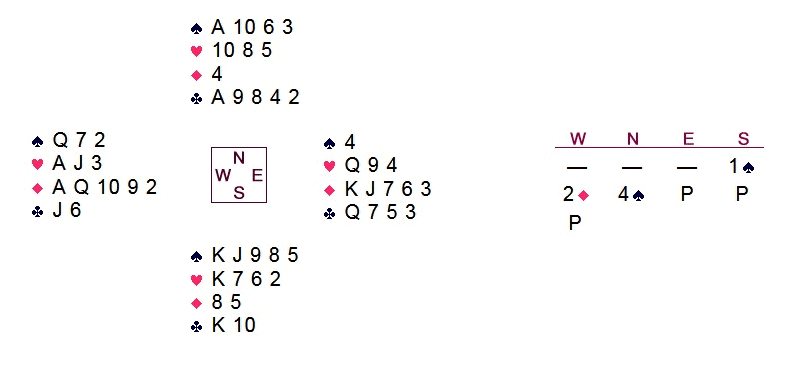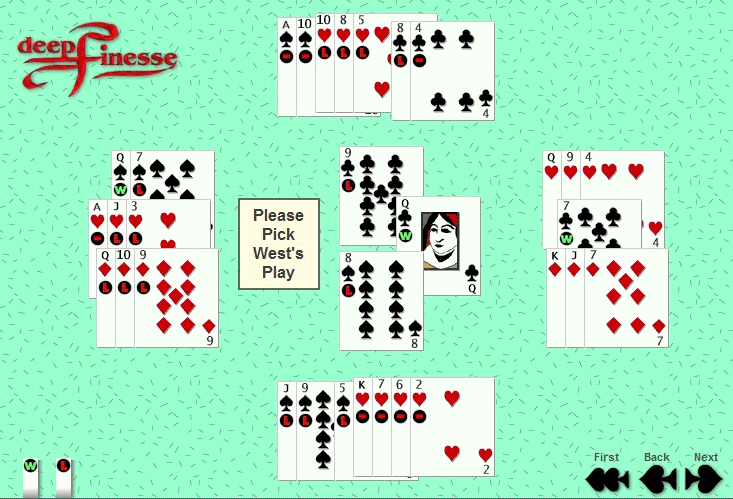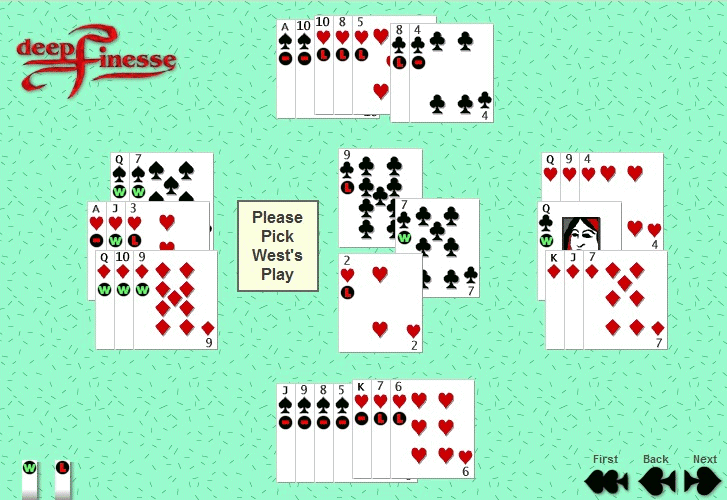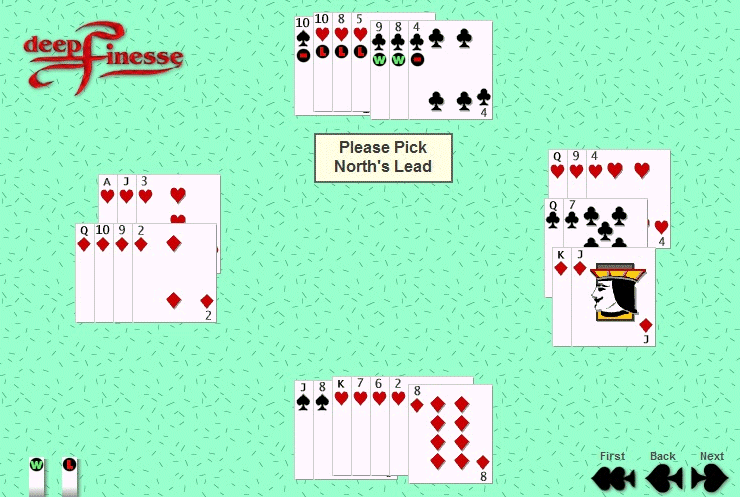

 |
 |
The Most Infamous Bridge Hand of Them All
— or —
The Most Unfortunate Analysis of Them All
The local bridge clubs serves as an unofficial book-exchange among many of its players, my spouse included. Making the rounds recently is one titled, The Devil's Tickets, which just happens to focus upon Myrtle Bennett, who in 1929 shot and killed her husband over the outcome of a bridge hand.
While discussing the book with my bride, I was prompted to look up the event online. Extensive searching found many articles on the topic featuring the estimated actual deal, circumstances of the shooting, and details of the subsequent farcical trial.
Naturally, there was much speculation at the time about how the hand
was played and whether a different line might have forestalled the murder.
Unfortunately, none of the survivors of the incident could recall exactly what
the hands were; and since some of the cards had been thrown around the table,
no one else could reconstruct it either. Eventually, an actual
52-card layout started making the rounds of the periodicals.
Ely Culbertson even discussed this 'Fatal Hand' on his popular lecture circuit,
knowing fully well that it had been fabricated.
What I did not find online, to my amazement, was anything remotely resembling a competent analysis of the deal in question:

The opening lead was the ace of diamonds, followed by a shift to the jack of clubs. Both Culbertson and his chief rival Sydney Lenz reportedly showed that declarer had been in position to fulfill his contract by guessing the trumps and setting up dummy's clubs for two heart discards. At the table, however, Jack Bennett apparently misguessed the trumps and stranded dummy's established club winners, finishing two down.
Although there are several online versions of the actual wording of Culbertson's testimony at the murder trial, all are in agreement with this:
"Mr. Hoffman opened the diamond ace, then shifted to the club suit when he saw the dummy void of diamonds, and led the club knave. This Mr. Bennett won with his king and started to pull the adverse trumps. Here again he flirted with death, as people so frequently do when they fail to have a plan either in the game of bridge or the game of life. He still could make his contract and save his life.
The proper play before drawing the trumps would have been to
establish the club suit, after ruffing the last diamond in the closed hand,
upon which to discard losers in his own hand. Suppose Mr. Bennett,
when he took the club trick with his king, had led his last diamond and
trumped it with one of dummy's small trumps. He could then lead a
trump and go up with the king. ...Now he would lead the club ten, and,
when Mr. Hoffman followed suit, his troubles would be over. He would
play the ace of clubs and lead the nine or eight. If Mrs. Hoffman put
up the queen, Mr. Bennett should trump and let Mr. Hoffman over-trump
if he pleased.
If Mr. Hoffman, after winning his trick, led a heart, the contract and a life would be saved. If he led a diamond the same would be true. A lead of the trump might still have permitted the fatal dénouement; but at least Mr. Bennett would have had the satisfaction of knowing that he had played the cards dealt him by fate to the very best of his ability."
Wow! That was quite a mouthful of fancy rhetoric. If it actually is the gist of what Culbertson said, however, then the man insulted himself in front of God and everybody; for his suggested line of play was hopelessly flawed. Let's try it:
In the following diagram, DeepFinesse shows us that if east's queen of clubs is ruffed, west can indeed defeat the contract by overruffing.

Culbertson's presumed testimony said that a trump return at this point
"might" defeat the contract, but was he really unsure? In fact, it
would more or less guarantee to defeat the contract, leaving declarer
with two heart losers even after cashing dummy's good clubs. (The only
other possibility would be if declarer had started life with
♣KQx in clubs, in which he could have ensured
his contract by safely playing spades into the west hand, keeping east out
of the lead.)
Alternatively, what if east properly ducks the third round of clubs? Culbertson never mentioned that contingency, and neither have most blogs:

Now, west has no fewer than six winning plays, not that it really matters. A set is a set. Culbertson committed a cardinal timing error of squandering a dummy entry by ruffing the diamond too soon. Any good player knows better than that. It seems that Ely, being willing to lose a trump trick, was focusing on some sort of potential endplay that would enable declarer to avoid two heart losers. Had west been dealt just a doubleton queen of trumps, the play would have worked; but in that case Jack Bennett would have made his contract just by playing off the two top trumps.
Now let's go back and help Mr. Bennett to make the hand. In absence of a magical strip and endplay, declarer must lose a diamond and two heart tricks for sure; therefore, the trumps must be picked up without loss. Let's do that:

If the club nine is not covered, declarer pitches a heart, not caring whether it wins or loses. Either way, he eventually wins five spades in hand, a diamond ruff, and four club tricks. The realistic option of a simple finesse in trumps is a lot better than Culbertson's suggestion of hoping for a silly error. Even the ACBL Encyclopedia of Bridge entry ignored the flaws in these analyses. Go figure.
I would like to think that Sidney Lenz, one of history's finest analysts, did not concur in that faulty analysis; but we may never know. And if Culbertson actually had shown the world that the contract was easily makeable at the time, then why in hell didn't he say so at the trial? I don't get it.
In any case, had Culbertson spent more time working on the hand instead of his cutesy speech, perhaps the jury would have had more sympathy for poor Jack Bennett and less for his assassin; and perhaps then justice would have been served after all.
So is that the end of it? Nope. This brings us to the aspect of the issue that flabbergasts me the most. Although it was shown that a successful line of play had been available to Mr. Bennett, no one at all, then or since, seems to have mentioned the fact that Bennett's opportunity was made possible only because of poor defense. Any expert would recognize the futility of switching to dummy's long suit, preferring instead to attack the entries by playing on his own stuff (especially after a helpful signal from partner). Yes, for the very same reason that declarer cannot afford to ruff a diamond early:
A diamond continuation at trick two defeats the contract!
Now, declarer lacks sufficient entries both to draw all the trumps and enjoy the club suit, and the hearts cannot be managed with just two losers. Apparently you heard it here first; and frankly, it didn't take the help of DeepFinesse to figure it out. It's elementary, my dear Culbertson.
Bah, humbug!